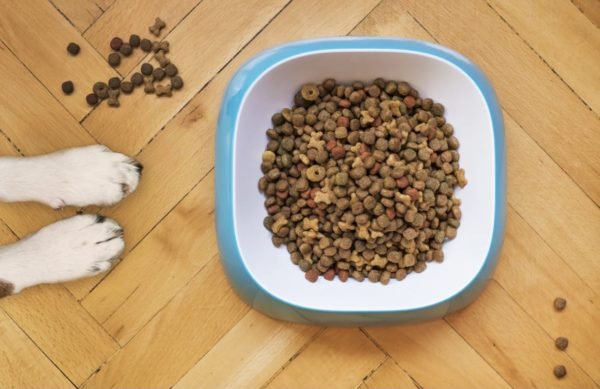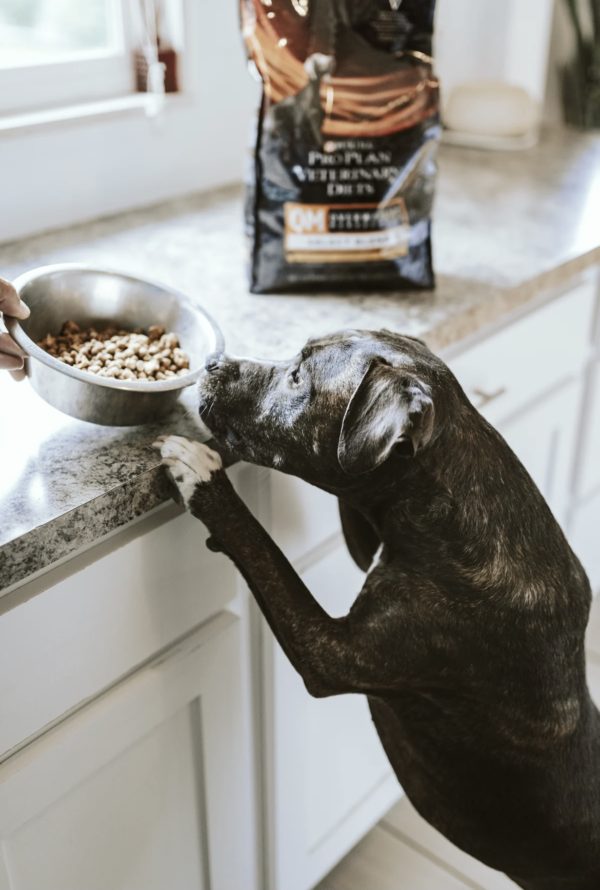
How Much Food Should I Feed My Dog?

One sure way to keep your dog happy is by feeding them well with the appropriate food and quantities. Offering your dog insufficient food portions may result in unwanted weight loss and potential nutritional inadequacies. However, providing too much food also comes with a few health disadvantages, with being overweight/obese as the most obvious one. Some of the health issues caused by excess food include musculoskeletal disorders, laboured breathing, skin disorders, congestive heart failure, and some types of cancers. The quantity of food you give your dog depends on factors such as age, breed, size, activity level, and external temperature.
Food Requirements According to Your Dog’s Age
Puppies and grown dogs have different food requirements. Below are the recommended general feeding guidelines for the various stages of a dog’s life.
Puppy Feed Requirements
Most people wean their puppies at six to seven weeks. Before weaning, one can offer the puppies a soft mush of puppy kibble. Use warm water to make the kibble into a mush. After six weeks, wean your puppies using food formulated to provide the required nutrients in balanced amounts. You should divide the daily food allowance into small portions that you’ll give to the puppies throughout the day. When first weaning your pup, you should offer small amounts of feed, like nom nom vs. the farmer’s dog, 4-5 times daily.
If you use puppy pouches, you can keep leftovers in a fridge and still feed the pups the next day. It’s important to note that they’re sensitive to food changes. To avoid stomach disorders, consider changing their diet gradually as opposed to suddenly. As a rule of thumb, you should transition over a 10-12 day period, gradually increasing the amount of new food. For example, days 1-3 use 25% new/75% old food, days 4-6 50%/50%, days 7-9 75%/25% with a full transition to the new food around days 10-12.
Most experts agree when it comes to food rationing. For puppies, consider offering 20g of dry food per 1 kg of your pup’s body weight daily. For example, a puppy weighing 5kg should eat 100g per day, while a puppy weighing 10kg should eat 200g per day. However, all food manufacturers are required by law to state how much to feed your pup on the packaging, so please always check there first as the above is a guideline.
Here are more food suggestions for your dogs from Angela Bronan at Walkies and Whiskers.
Junior Dog Feed Requirements

A junior dog is the transition period between a puppy and an adult. It would be best if you fed your junior puppers two to three times a day. As your puppy grows, you may notice they’re becoming more interested in foods that have certain textures and flavours. This is perfectly normal since your furry friend is developing their personality and preferences. Consider moistening dry food with water to increase its palatability.
Consider offering 15g of dry food per 1 kg of body weight daily for junior dogs. For example, a 5 kg junior dog should eat 75g per day, while a 20kg junior doggo should consume 300g daily. As for puppies, always check the packaging to be sure that you are feeding the correct amount.
Adult Dog Feed Requirements
An adult canine is aged between one and seven years. The general rule of the thumb is feeding 10g for every 1kg of body weight daily. For example, an adult dog weighing 5kg should eat 50g per day, while a dog weighing 40kg should eat 400g per day. You can provide your adult dog one serving per day, but you can also consider splitting the servings to two per day. As for puppies, always check the packaging to be sure that you are feeding the correct amount.
Senior Dog Feed Requirements
Senior dogs can take one or two meals in one day, just like adult dogs. However, you might want to consider adjusting your old friend’s diet due to their health requirements. Senior dogs require joint and heart health support, hence the need to change their diet accordingly and to see your veterinarian regularly to ensure they can identify any problems as early as possible.
Most experts recommend feeding 39-78 g to your senior dogs that weigh 4.5-9 kg, while a senior dog weighing 23-32 kg should eat 233-310 g per day. If your senior dog weighs 50-64kg, you can give them 465-620g of dry food per day. As for puppies, always check the packaging to be sure that you are feeding the correct amount.
Final Thoughts

Most dog foods, including French bulldog food, come with a feeding chart. Reading through the chart before feeding your furry friend is essential to ensure you adopt the proper feeding habits. You can also consider visiting a veterinarian for advice regarding your canine’s diet and health. The veterinarian will offer you advice based on their specific food requirements.














































